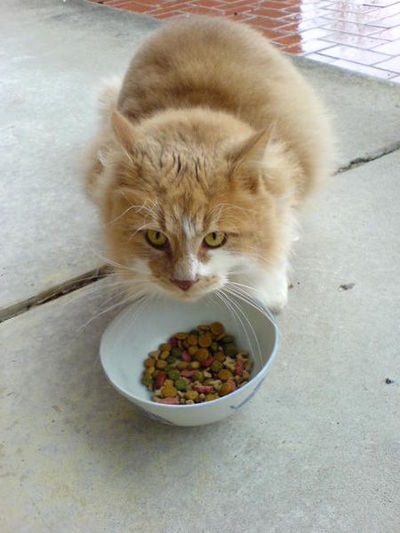
Cat Food Allergies
Veterinarian Reviewed on June 17, 2012 by Dr. Janice Huntingford
Cat Food Allergies (Feline Food Allergies)
Cat Food Allergies
Food allergies in cats are more common they you think. Food allergies cause more than 50% of itching and scratching experienced in cats.
Food allergies do not discriminate between different breeds of cats or whether they are male or female. Food allergies in cats can occur in cats as young as 5 months and as old as 12 years. Many cats with food allergies also experience other allergies at the same time.
Research has shown that certain kinds of ingredients are more prone to causing food allergies than others. The ingredients most likely to cause food allergies in cats are soy, corn, beef, lamb, seafood, wheat gluten, and dairy products. As you can see by reading the Cat Food Labels on Cat Food packages, these ingredients are commonly found in many foods that are fed to cats.
Food Intolerance vs. Food Allergy
Many pet owners are confused between a food allergy and simply an intolerance to a certain type of food. A food allergy is truly an allergy and is commonly noted through a cat constantly scratching itself or through a myriad of other skin issues. Food intolerance usually causes a cat to vomit or have diarrhea, but do not produce typical allergic reactions.
Both a food allergy and a food intolerance can be eliminated by simply removing the offending agent from the cat’s diet.
Signs and Symptoms
Symptoms of food allergies in cats are the same as other types of allergies found in cats. The main symptom of a food allergy in cats is itchy skin. Other symptoms include miliary dermatitis, loss of hair, and excessive scratching. Food allergies in cats are difficult to distinguish from other types of allergies based on signs that are physically related. Cats suffering from symptoms year round or during the winter are most likely to have a food allergy.
Cat Food Allergy Diagnosis
Before a cat is diagnosed with a food allergy all other causes should be ruled out first. The reason for ruling out other causes is due to the fact that other causes can create symptoms that are quite similar to food allergies. Such causes include Cat Ear Mites, Cat Fleas, Demodectic mange, fungal disease, endocrine or hormonal abnormalities or even inhalant or contact allergies.
Also, it is quite common for a cat to be suffering from a different condition in addition to a food allergy as well. Once other conditions have been eliminated, food allergies can be diagnosed by performing a food trial.
A food trial involves feeding the cat for 12 weeks with a carbohydrate and source of protein from a novel food. This novel food source must come from a food that the cat has not eaten before. Examples of sources for the food trial include venison and potato or duck and potato.
The food trial must last the entire twelve weeks and your cat must not be fed any type of treat or even flavored medicines. The cat must only be allowed to eat the special food and have access to plenty of fresh water. It is also a good idea to limit the cats outside roaming in order to keep them from gaining access to foods or garbage.
If the cat’s allergy symptoms are eliminated or reduced, then the cat will be put back on the original food after the 12 weeks have elapsed. Putting the cat back on the original food is essential in order to diagnose the existence of a food allergy. If the cat has a return of the allergic symptoms then it is clear the animal has a food allergy. In some cases there is no change in the symptoms and a food allergy may continue to be suspected. In this case the cat would be placed back on a food trial and a different novel source would be used.
Treatment
Once a cat is diagnosed with a food allergy the primary treatment is to avoid feeding the animal foods that contain ingredients that cause the allergic reaction. Eliminating these foods from your cat’s diet is the only solution that will provide long term relief from food allergies for your cat.
Short term relief for your cat from food allergies can be achieved through the use of antihistamines, steroids and fatty acids.
An owner may decide to feed the cat a diet that is homemade or a commercial diet that is specially prepared.
In the case of homemade diets, it is vitally important that the diet is balanced and has the correct amount of minerals, vitamins and protein.
Whether feeding a homemade diet or one that is commercially prepared it is always best to discuss the nutritional needs of your cat with a veterinary nutritionist.
Sign up for our newsletter and receive more articles and the latest pet health updates and special offers.
Our Expert
 Dr. Janice Huntingford
Dr. Janice HuntingfordJanice Huntingford, DVM, has been in veterinary practice for over 30 years and has founded two veterinary clinics since receiving her Doctor of Veterinary Medicine at the Ontario Veterinary College, University of Guelph. She has studied extensively in both conventional and holistic modalities. Ask Dr. Jan

